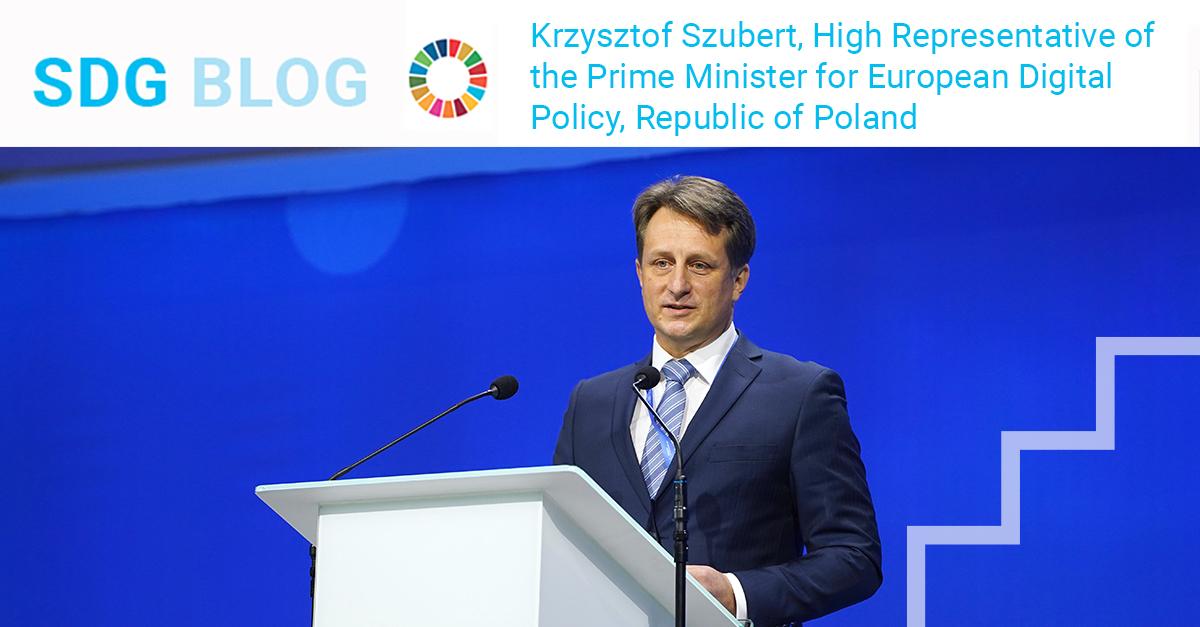SDG Blog

From the Internet Governance Forum to Our Common Agenda
By Krzysztof Szubert, High Representative of the Prime Minister for European Digital Policy, Member of the UN IGF Leadership Panel, Republic of Poland
Last December, Poland was the proud host of the United Nations Internet Governance Forum (IGF). The global, multi-stakeholder platform that we all know, was this time held under quite unusual circumstances, as we all had to face the COVID pandemic rules and restrictions. At the same time, we wanted the IGF annual meeting to be available and accessible to everyone who would like to join the global discussion. And we did it!
In person as it was, the 16th IGF provided a fully hybrid format for over 300 sessions that were held. We had a record number of almost 10,400 registered participants from 175 countries in all continents of the world. It was our honour to host over 2,700 participants onsite in the City of Katowice. We were joined by nearly 200 ministers, parliamentarians and other high-level leaders from the private sector, civil society, the technical community, and others.
Looking back now, I am proud that we made it possible for numerous policymakers, entrepreneurs, representatives of academia and non-governmental organisations, youth, and thousands of people from all over the world to meet and to debate the opportunities and challenges posed by the Internet, as well as ways to fully exploit the Internet’s potential. We encouraged organising stakeholders to do their best and to try to refer in their sessions to the most pressing global issues mentioned in the 2030 Agenda for Sustainable Development, especially Sustainable Development Goal number 9, expressing the need for building resilient infrastructure, promoting inclusive and sustainable industrialization, and fostering innovation. We all need to raise awareness and to provide people living in least developed countries with universal and affordable access to the Internet which accelerates progress, reduces the digital divide and helps societies to develop.
A positive vision for the future of digital services and the Internet itself must combine fundamental values such as human rights, access and openness, as well as economic considerations – this is just one of the conclusions included in the Katowice IGF Messages – a final document issued after the Forum. It is a toolbox of guidelines and approaches to Internet governance and digital policy issues.
Only by improving connectivity and bringing stakeholders together around this issue will we be able to achieve the Sustainable Development Goals and reduce barriers towards equality. Ensuring that all people have meaningful access to the Internet is a global priority. I am a big supporter of this message.
Katowice IGF Messages emphasize the human rights-based and multi-stakeholder approach to cybersecurity which leads to better results, and the key to the success is transparency and inclusion. Responsible use of artificial intelligence algorithms will ensure the protection of human rights. Therefore, policies should be developed to counter inappropriate applications.
Being a big advocate of the open Internet and the worldwide digital dialogue, I engage in activities that promote multilateralism and a multi-stakeholder approach. I also use every occasion to bring the Katowice IGF Messages to the attention of the decision-makers at international fora, as the IGF outcomes and decisions are essential within other global initiatives like the United Nations Secretary General’s Our Common Agenda, Roadmap for Digital Cooperation, the 2030 Agenda for Sustainable Development or the Digital Strategy 2022-2025. All these are to support countries and communities to use digital technology to drive down inequality, help inclusivity, tackle climate change, and open-up economic opportunities. To support these efforts, we need to create strong partnerships between existing agencies and organisations with a global or regional reach.
To make the world digitally better we need to foster collaborative relationships and boost partnerships between entities that have been created and supported in pursuit of common goals. Governments should take the lead and encourage national stakeholders and external partners (including international development agencies) to design, implement and monitor joint development strategies.
It is crucial that we look for a common ground and focus on strategic and vertical activities like building a complementary matrix of actions based on issue areas related to strategic and vertical directions like infrastructure and connectivity, e-services and open goods, skills, competencies and inclusion, cybersecurity and digital trust, international cooperation and investment and funds.
The latest UN E-Government Survey 2022 – The Future of Digital Government also provides vital data, analysis and recommendations to inform our work, ensuring that no one is left offline.
I also see an important role to be played by the IGF Leadership Panel recently appointed by the UN Secretary-General. It shall not only provide strategic inputs, support high-level and stakeholder engagement but also raise funds, exchange IGF outputs with other relevant fora and facilitate the input of these fora to the IGF’s agenda. Having received the honour of being a member of the Panel, I will do every effort to bring messages from the IGF to relevant decision-makers.
The Secretary-General will certainly engage the Panel and underline its importance to the global digital dialogue, as it consists of key individuals representing all stakeholder groups as well as the Technology Envoy, Multi-stakeholder Advisory Group (MAG) Chair and annual IGF Host Countries.
Should you wish to contact me to discuss some issues further please use these links https://www.linkedin.com/in/krzysztofszubert/ or https://twitter.com/KrzysiekSzubert.
* The views expressed in this blog are the author’s and do not necessarily reflect the opinion of UN DESA.
 Welcome to the United Nations
Welcome to the United Nations